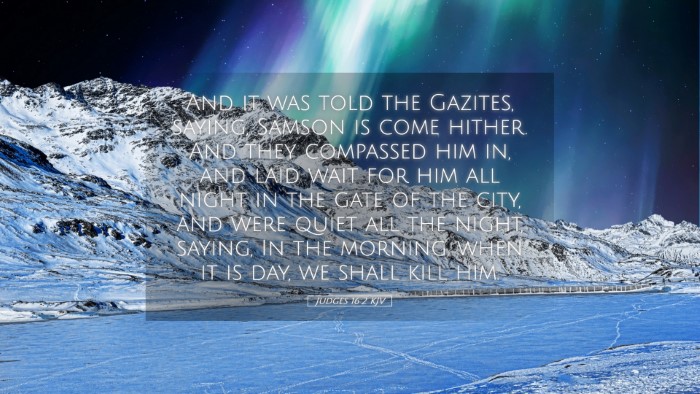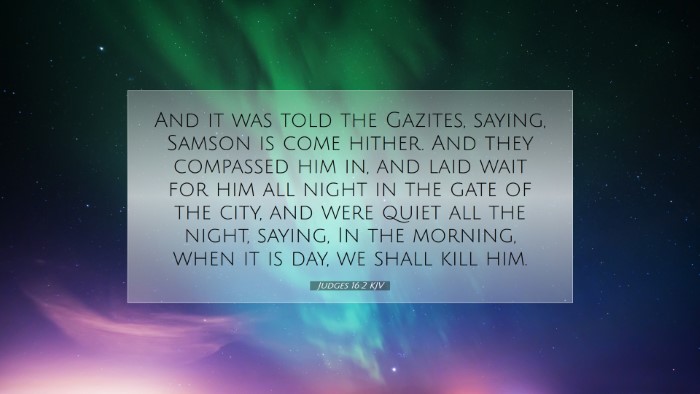Commentary on Judges 16:2
Verse Reference: Judges 16:2 - "And it was told the Gazites, saying, Samson is come hither. And they compassed him in, and laid wait for him all night in the gate of the city, and were quiet all the night, saying, In the morning, when it is day, we shall kill him."
Contextual Background
The narrative of Samson is quintessential within the Book of Judges, depicting not only the strength and victories of the Israelite hero but also the flaws inherent in his character. Judges 16 marks the culmination of Samson's story, wherein his entanglement with Delilah leads to both personal and national tragedies.
This specific verse captures the pivotal moment of Samson’s arrival in Gaza, a Philistine stronghold, which heightens the tension between him and the Philistines. The Philistines had long sought to subdue Samson, recognizing him as a significant threat to their dominance over Israel.
Insights from Matthew Henry
Matthew Henry emphasizes the audacity of Samson’s actions—venturing into enemy territory. He reflects on the spiritual implications of such conduct, noting, "Samson’s coming to Gaza signifies his departure from the path of duty." Henry elucidates that this act reveals how far Samson had strayed from his Nazirite vows and divine calling.
Henry points out the strategic qualities of the Philistines in their approach to capture Samson. Instead of reacting hastily, they chose to wait until morning, showcasing their cunning. "They were quiet all the night," suggests a calculated approach, illustrating how evil seeks to ensnare the righteous.
Reflections from Albert Barnes
Albert Barnes draws particular attention to the behavioral patterns of the Gazites, who were described as hedging in Samson. He interprets this as indicative of the broader human condition, revealing an unrelenting pursuit of righteousness but often allowing sinful inclinations to overshadow such pursuits.
Barnes notes, "The act of laying in wait shows a disposition of malice.” This act illustrates the lengths to which those who oppose God’s chosen will go in order to eradicate them. Further, he observes that "the Philistines thought that they could contain Samson as long as they held to wisdom in timing." The implication underscores that sometimes adversaries may indeed approach with wise strategy, yet God’s providential will prevails.
Insights from Adam Clarke
Adam Clarke offers a critical examination of Samson's character in this verse. He posits that Samson’s entrance into Gaza was likely motivated by a sense of invulnerability, shaped by his past victories. Clarke writes, "Samson's strength had made him presumptuous." He warns that such misplaced confidence can ultimately lead to downfall.
Furthermore, Clarke expounds on the condition of his enemies. Their determination to capture him expresses a deep-seated enmity, one that mirrors the spiritual battle faced by believers. This waiting period for the Gazites serves a dual purpose: revealing their commitment to confronting evil while also serving as a reminder that evil cannot triumph over God’s purpose.
Theological Implications
The events depicted in Judges 16:2 serve as poignant reminders to pastors and theologians on several fronts:
- God's Sovereignty: Despite human actions, divine oversight prevails. This passage encourages scholars to articulate the assurance of God’s presence amidst trials.
- The Nature of Sin: Samson’s actions exemplify the perils of moral compromise. He entered a stronghold of sin, illustrating how vulnerability can lead to greater spiritual adversities.
- Spiritual Warfare: The passage highlights the reality of spiritual combat. The waiting Gazites reflect the adversarial actions against God’s anointed, prompting the need for vigilance among believers.
- Redemptive Grace: Despite Samson’s folly, it also points to the overarching theme of redemption, showcasing that God’s plans carry through even amidst human failures.
Conclusion
Judges 16:2 encapsulates a significant juncture in the life of Samson, encapsulating themes of strength, pride, and ultimately, a warning against moral compromise. By merging insights from Matthew Henry, Albert Barnes, and Adam Clarke, this commentary serves as a rich resource for pastors, students, and theologians seeking to deepen their understanding of not just the text itself but the profound theological implications embedded within it.


